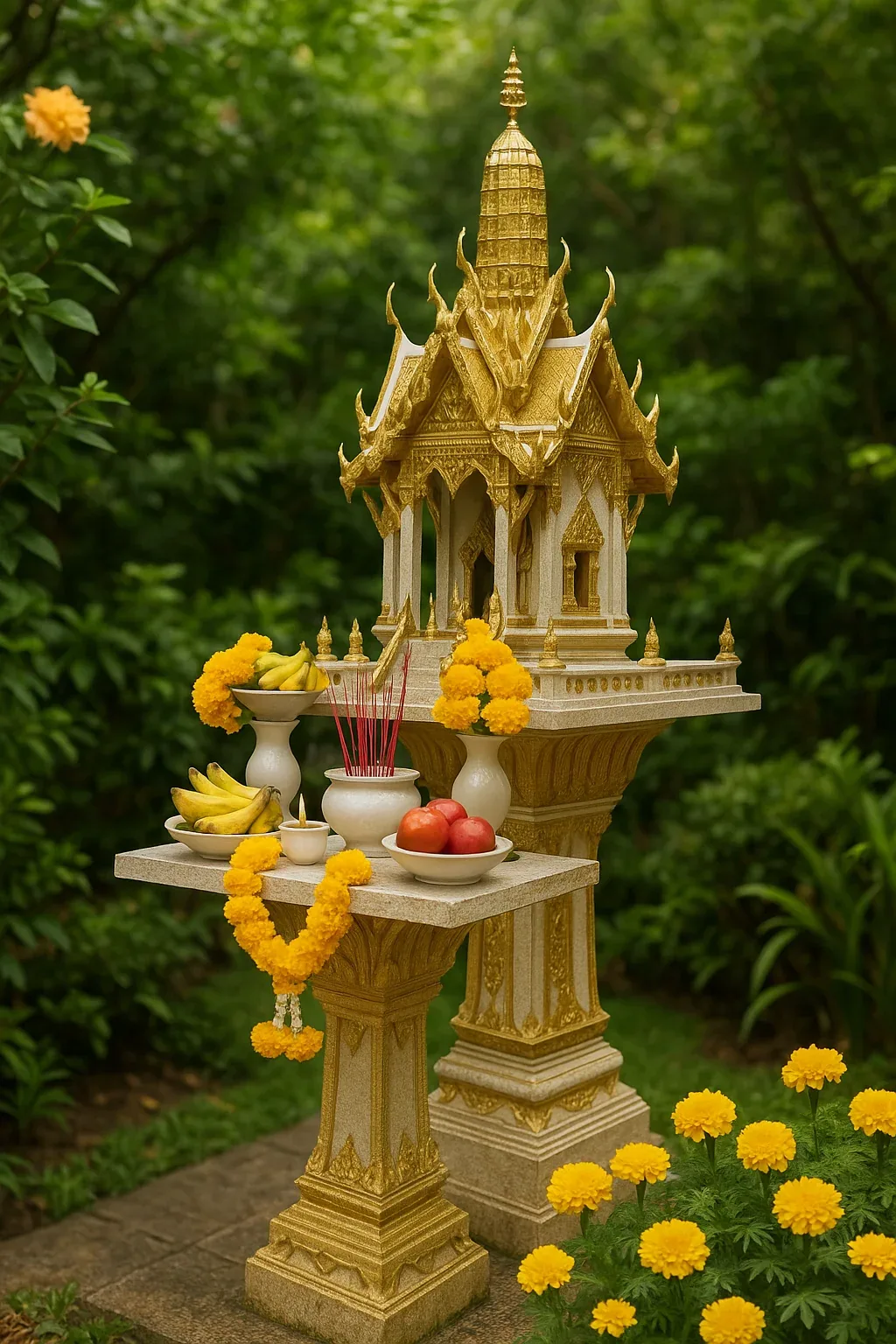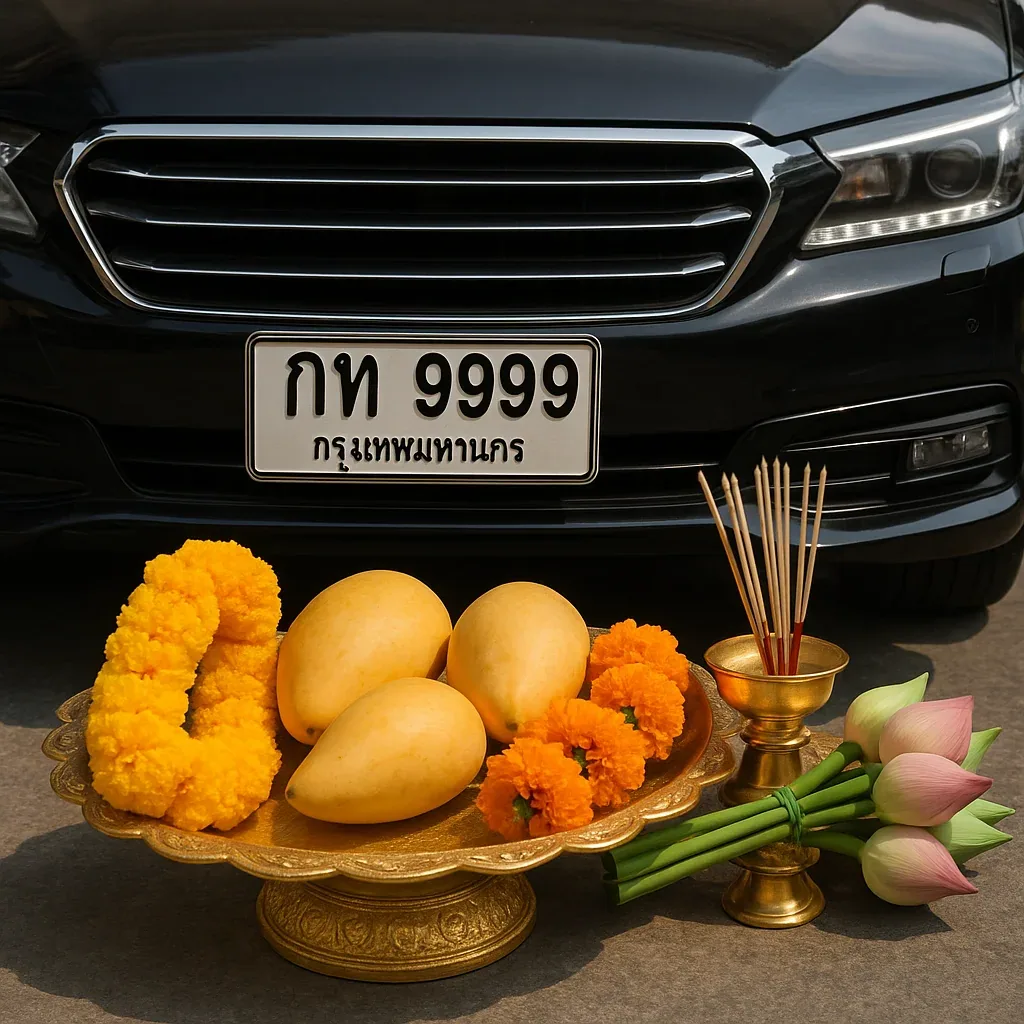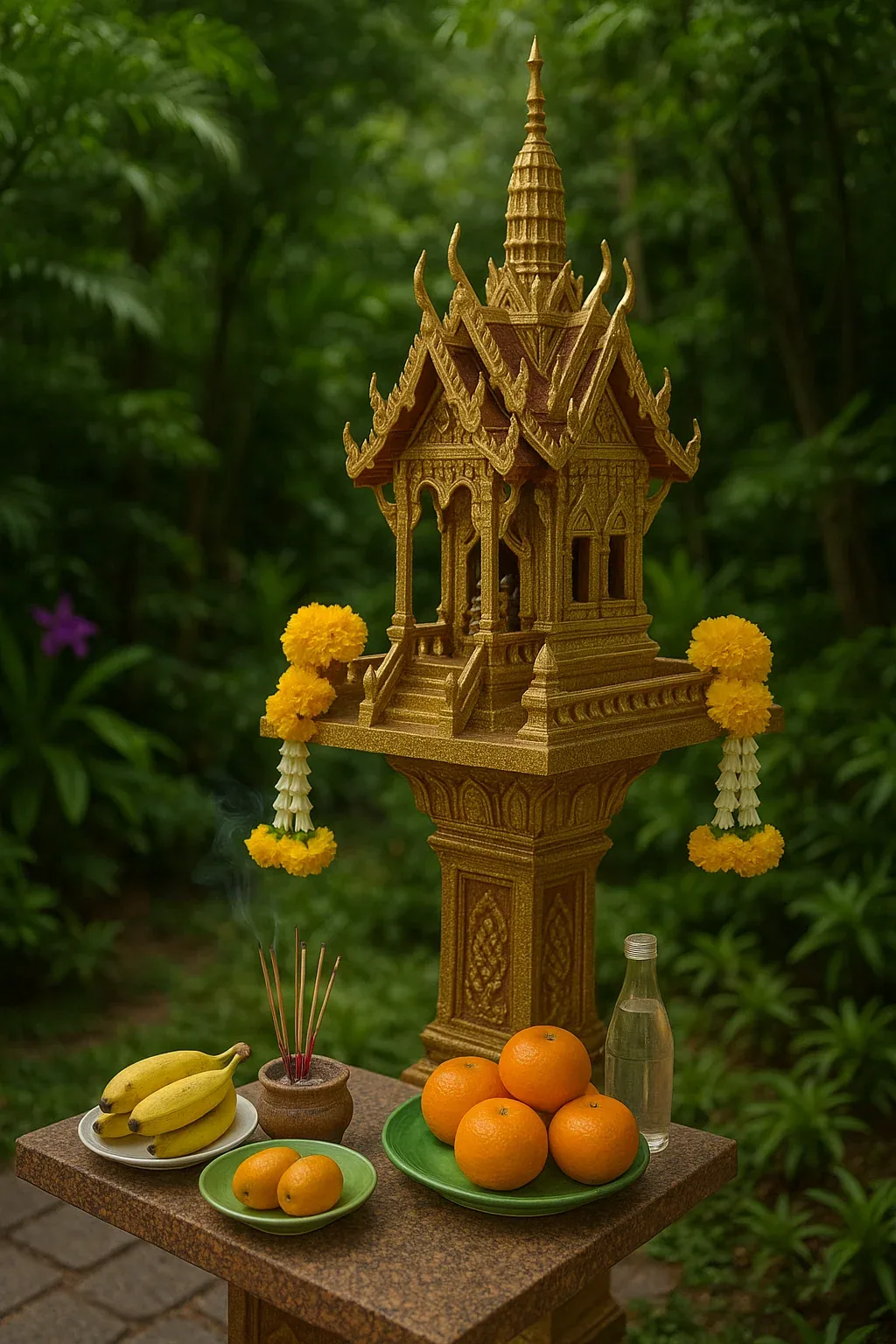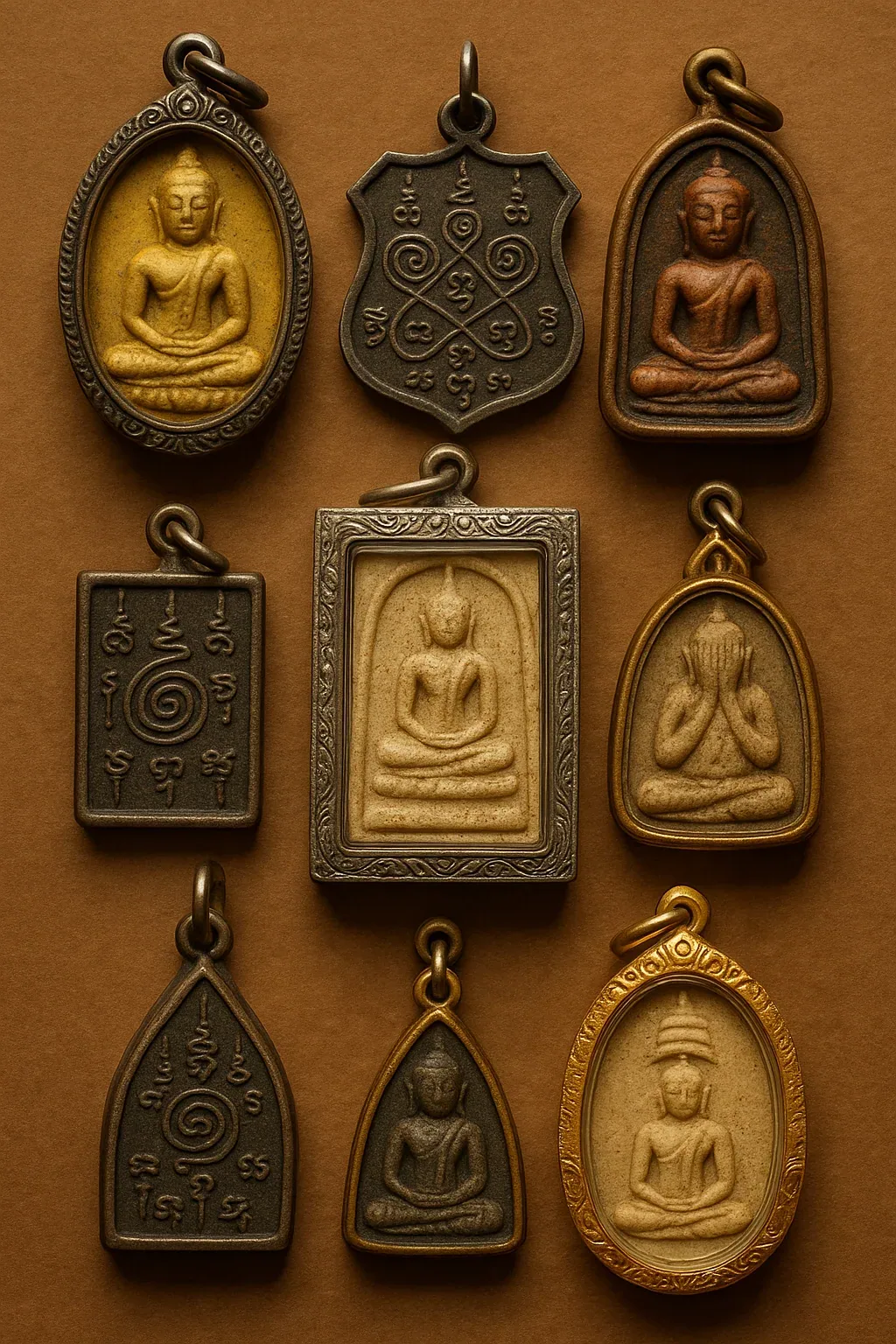
🔮Thai Superstitions
Lucky numbers, spirit beliefs, and the taboos that shape daily life

Lucky numbers, spirit beliefs, and the taboos that shape daily life
Your Thai colleague refuses to sign the contract today—the astrologer said Wednesday afternoon is inauspicious. The property agent won't show you apartment 444 but pushes hard for unit 999, even though it's beyond your budget. A new shopping mall's grand opening happens at exactly 9:09am, and your landlord insists on having monks bless your apartment before you move in. Welcome to Thailand, where superstitions aren't quaint folklore—they're operating instructions for daily life.
These beliefs might seem puzzling at first, especially to Western expats raised in rationalist traditions. But Thai superstitions represent something more nuanced than simple credulity. They're a layered blend of Buddhist philosophy, Hindu-Brahmin astrology, and ancient animist beliefs about spirits inhabiting everything from trees to doorways. More importantly, they're deeply embedded social practice—whether someone genuinely believes whistling at night summons ghosts matters less than the fact that everyone knows you don't whistle at night.
Understanding Thai superstitions isn't about adopting them yourself. It's about recognizing the invisible architecture of belief that shapes business decisions, property values, social interactions, and the rhythm of daily life. That understanding transforms seemingly irrational behavior into perfectly logical cultural practice, and it prevents you from unknowingly offending or creating awkwardness in situations where Thai sensibilities matter.
"Thai superstitions aren't quaint folklore—they're operating instructions for daily life, an invisible architecture of belief that shapes everything from business deals to property values."
If there's one number that unlocks Thai culture, it's nine. Not because of any mystical property, but because of linguistics: in Thai, nine (kâo, เก้า) sounds nearly identical to the word for "progress" or "move forward" (gâo-nâa, ก้าวหน้า). This phonetic connection has elevated nine to a status approaching religious reverence. You'll see its influence everywhere once you start looking.
Business launches often aim for "9" times (e.g., 9:09am) for luck. Property prices list at 9.99 million baht instead of an even 10 million. Phone numbers with strings of 9s have sold for ฿4.5 million at auction. License plates containing 9s regularly fetch multi-million-baht bids at Department of Land Transport auctions—with premium Bangkok plates like "9กก 9999" commanding ฿28 million or more. When King Rama IX passed away in 2016, the number nine took on additional sacred meaning, forever linking numerical luck with national grief and reverence.
But nine isn't the only significant number. Five is popularly associated with laughter ("555" being the Thai text equivalent of "haha"), though 8 and 9 drive most "lucky number" demand. Eight, borrowed from Chinese tradition, brings wealth—you'll see 888 nearly as often as 999 in pricing. Four isn't inherently unlucky in Thai tradition, but Chinese influence means some buildings and buyers avoid it. Similarly, Western influence has led some hotels and condos to skip floor thirteen. What matters is the pattern, the repetition, the phonetic resonance. Thai number superstitions are fundamentally about language making reality.

When apartment hunting, you'll notice properties with lucky numbers can be easier to market and sometimes command a premium, though evidence is anecdotal. Units and floors with "lucky" digits are often pushed harder by agents. Ground floor units ending in 9 are especially prized. Conversely, properties with numbers like 13 or 444 (influenced by Chinese buyers) may sit empty or require price reductions.
For expats, this creates opportunities. If you're ambivalent about numerology, negotiating on a "less lucky" unit can save money while getting the same square footage and amenities. Your Thai friends might question your choice, but your bank account won't.
Every Thai person knows their birth day color—not their favorite color, but the color cosmically assigned to the day of the week they were born. This system comes from Hindu astrology, mapping seven days to seven celestial bodies, each with a corresponding color and spiritual energy. It's not casual knowledge; it's fundamental identity, like knowing your blood type or zodiac sign in Western culture.
Monday's yellow honors the moon. Tuesday's pink connects to Mars. Wednesday divides between green for daytime births and black (or dark gray in some lists) for night. Thursday's orange represents Jupiter. Friday's blue links to Venus. Saturday's purple belongs to Saturn. Sunday's red celebrates the sun. You'll see Thais wearing their birth color for important events—job interviews, weddings, medical appointments—or simply on days when they need extra luck.
The royal connection amplified this practice. King Rama IX was born on a Monday, making yellow simultaneously his personal birth color and a symbol of devotion to the monarchy. During his reign, Thais wore yellow en masse every Monday, and the color became so strongly associated with royalty that yellow shirts became the uniform of royalist political movements. Even now, years after his death, you'll see more yellow worn on Mondays than any other day of the week.
Red holds special protective power beyond its Sunday association. During pi chong (ปีชง)—an unlucky year that arrives every twelve years in the cycle corresponding to your birth year in the Thai zodiac—many people wear red or carry red talismans; some even opt for red undergarments, a Sino-Thai practice that mirrors Chinese ben ming nian customs. It's basically Thai culture's version of Mercury retrograde, and red supposedly shields you from the year's enhanced vulnerability to bad luck and misfortune. For more on how Buddhist beliefs intersect with these practices, our guide explains the philosophical foundations.
→ Monday (Yellow): Moon energy, associated with peace and calm
→ Tuesday (Pink): Mars energy, associated with action and courage
→ Wednesday Day (Green): Mercury energy, communication and intelligence
→ Wednesday Night (Black): Mercury energy, introspection
→ Thursday (Orange): Jupiter energy, growth and expansion
→ Friday (Blue): Venus energy, love and creativity
→ Saturday (Purple): Saturn energy, discipline and karma
→ Sunday (Red): Sun energy, power and leadership

In Thailand, most homes and businesses maintain a spirit house (ศาลพระภูมิ, san phra phum). These miniature temples, positioned at precise locations often determined by a Brahmin priest or ritual specialist, house the land spirits (phra phum) displaced when the structure was built. The logic is impeccable: you're building on land where spirits lived first. You need to offer them proper accommodation and regular respect, or they'll make your life miserable through illness, bad luck, and business failure.
Fresh offerings appear daily—rice, fruit, water, Thai desserts, sometimes red Fanta (nam daeng) or other sweet drinks. Incense smoke curls up every morning and evening. Before important business decisions or family events, you'll see people kneeling before spirit houses, hands in prayer position, asking for blessing and protection. This isn't Buddhism—spirit houses predate Buddhism by centuries, rooted in animist traditions that never disappeared despite waves of imported religion.
Beyond the spirit houses, Thailand maintains a rich taxonomy of ghosts. There's phi tai hong, the violent death ghosts that haunt accident sites. Phi krasue, the floating head with trailing entrails seeking raw meat and blood. Mae nak, the pregnant woman ghost whose love story is Thailand's most famous ghost tale. These aren't Halloween decorations or campfire stories—they're entities Thais genuinely believe exist, explaining misfortune and maintaining moral order through fear of spiritual consequence.
This ghost belief system generates real behavioral patterns. Whistling at night attracts malevolent spirits—don't do it. Pregnant women avoid funerals because ghosts might possess the unborn child. Dreams of deceased relatives require immediate attention and merit-making ceremonies. Property where someone died violently loses significant value. The abandoned Sathorn Unique tower (Bangkok's "Ghost Tower") was left unfinished primarily due to the 1997 Asian financial crisis, though locals sometimes explain its derelict state through spiritual causes, reinforcing haunting narratives that have accumulated over decades.
Wednesday haircuts illustrate how superstition shapes business. Walk past hair salons on Wednesday, especially in traditional neighborhoods, and you'll find them eerily quiet or completely closed. The belief that Wednesday haircuts bring misfortune is strong enough that salon owners simply accept losing one-seventh of their potential revenue rather than fight cultural tide. Some salons stay open but offer discounts, acknowledging the reduced demand from superstitious clients.
Sweeping at night sweeps away your fortune—so people sweep during daylight hours, or not at all if daylight has passed. Cutting nails after dark invites bad luck, so proper Thais handle their grooming before sunset. Singing while eating means you'll marry someone old, which mostly just entertains parents trying to keep dinner peaceful. Opening umbrellas indoors brings misfortune, a belief Thailand shares with many cultures. Pointing at rainbows causes finger deformities—children learn this early and internalize a reflexive reluctance to point at them.
Pregnancy amplifies superstition exponentially. Pregnant women face a labyrinth of taboos: no funerals or temples during certain phases, no consuming certain foods (varies by region and family), no exposure to eclipses, no stepping over ropes or sitting in doorways. The traditional practice of yu fai—lying by fire for a month after giving birth—has declined in urban areas but remains common in rural Thailand and among traditional families. These aren't suggestions; they're protocols enforced by mothers, mothers-in-law, and extended family networks who genuinely fear spiritual consequences for violations.
You don't need to believe, but you need to respect. If your Thai business partner wants to postpone a meeting because the day is inauspicious, agree gracefully. If your landlord asks you to participate in a monk blessing ceremony, attend and observe respectfully. If someone warns you against specific behaviors, follow their guidance in their space.
Use superstitions strategically. Learn your Thai birth day color and wear it occasionally—Thai colleagues will notice and appreciate the cultural awareness. When negotiating property, remember that "unlucky" numbers might give you leverage for price reductions.
Never mock or dismiss these beliefs publicly. That joke about spirit houses being fairy tales? It's offensive and marks you as culturally insensitive. Thais are often remarkably tolerant of skepticism expressed privately, but public ridicule of beliefs their parents and grandparents hold sacred creates permanent relationship damage.

Thai astrology is serious business—literally. Major corporations consult astrologers before product launches, building groundbreakings, and executive hirings. Wedding dates are chosen months in advance based on astrological compatibility and auspicious timing. Even government decisions sometimes defer to astrological counsel, though this is rarely admitted publicly.
This isn't the casual horoscope reading of Western newspapers. Thai astrology blends Hindu-Vedic traditions with Chinese zodiac systems, creating complex calculations involving birth times, lunar phases, planetary positions, and numerical patterns. Professional astrologers train for years, and their services command significant fees. The most respected astrologers maintain waiting lists of months for consultations, particularly around auspicious times for weddings and business ventures.
For expats working in Thailand, this creates interesting dynamics. Your Thai business partners might seem inexplicably resistant to signing contracts on specific dates, not because they're stalling but because their astrologer advised against it. Construction projects might pause for days waiting for an auspicious time to pour foundation. Office moves happen at bizarre hours—3:47am, for instance—because that exact moment carries optimal energy. Understanding that these aren't whims but deeply considered spiritual-timing decisions helps maintain patience and partnership.
Thailand's Sangha Council periodically reiterates warnings against monks engaging in fortune-telling and lottery prediction—activities officially considered superstitious. Yet in practice, most Thai Buddhists seamlessly blend Buddhist merit-making with Hindu astrology and animist spirit beliefs. Monks bless new buildings. Buddhist amulets offer protection. This syncretism doesn't bother most Thais—it's simply how spirituality works here, multiple systems operating simultaneously without contradiction.
Here's what took me years to understand: the question of whether Thais "really believe" their superstitions misses the point. Belief exists on a spectrum. Your educated Bangkok colleague might intellectually dismiss spirit houses as folk tradition while still making daily offerings to theirs. The property developer might privately doubt that the number 9 has mystical power while still pricing units at 9.99 million baht because that's what buyers expect and value.
Superstitions in Thailand function as social technology—systems that reduce anxiety, create shared meaning, maintain tradition, and provide frameworks for decision-making in an uncertain world. When your Thai landlord insists on a monk blessing ceremony before you move in, they're not trying to convert you to animism. They're ensuring the spiritual conditions for your mutual success, honoring their responsibilities to the land spirits, and following protocols their parents followed. Your participation is courtesy, not conviction.
The practical impact extends into nearly every domain of Thai life. Real estate values fluctuate based on feng shui and numerical luck. Business openings cluster around astrologically auspicious dates. Entire industries exist to serve superstition: amulet markets, astrology consultants, spirit house craftsmen, fortune tellers, and specialists in removing spiritual contamination from properties. Understanding these systems doesn't require believing them, but it does require recognizing their economic and social reality.
Living in Thailand means living alongside these beliefs, navigating a landscape where the visible world of traffic and smartphones and air-conditioned malls overlays an invisible architecture of spiritual forces, auspicious numbers, protective colors, and ghost-inhabited corners. You don't need to adopt this worldview. But respecting it—taking it seriously as something your neighbors, colleagues, and friends genuinely care about—transforms Thailand from bewildering to comprehensible. And that understanding, more than any lucky amulet or birth day color, helps you build the relationships and cultural fluency that make expat life here actually work. For more insights into Thai customs and etiquette, explore our comprehensive cultural guides.
LUCKY
UNLUCKY
Remember
You don't need to believe these superstitions, but respecting that Thais take them seriously maintains social harmony and cultural sensitivity.
9 (Kâo)
Most auspicious · Sounds like "progress" · Premium pricing
8 (Paet)
Brings wealth · Chinese influence
5 (Ha)
Associated with laughter ("555") · General positivity
License plates with lucky numbers sell for millions at auction
→ Learn your Thai birth day color (calculators online)
→ Wear it occasionally to show cultural awareness
→ Negotiate discounts on "unlucky" numbered properties
→ Attend spirit house ceremonies if invited
→ Never mock superstitions publicly